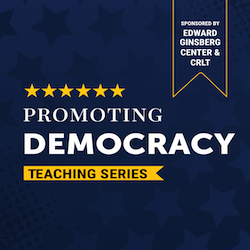CRLT is accepting applications through Monday, February 23, for the May Preparing Future Faculty (PFF) Seminar, which interested graduate students can learn more about here. In this guest post, Screen Arts and Cultures PhD student Katy Peplin reflects upon her experiences in the seminar last spring.

As with so many opportunities in graduate school, I was thrilled beyond measure to be teaching my own course in the Summer term of 2015, but was filled with an equal measure of fear. I had many goals, and spent a great deal of time imagining all the ways that my class would transcend all previous classes. It would be challenging and accessible, discipline specific and yet inviting to everyone, and be effortless to prep and teach. In my years as a GSI and as a student myself, I had cultivated considerable “back seat driving” skills when it came to others’ courses, but I had no language or framework for translating my opinions about what did and didn’t work about other courses into a syllabus or teaching philosophy.
Luckily for me, the notification of teaching assignments was in my inbox as the email encouraging me to apply for the Preparing Future Faculty (PFF) seminar arrived. When I read that I would leave the 10 day seminar with a course syllabus, in addition to a teaching philosophy and a CV item, I jumped at the chance and applied. What I didn’t know is that not only would PFF help me shape my syllabus, but it would help me shape myself as a teacher, a scholar and a professional as well.
As a Ph.D. student in the Screen Arts and Cultures department, I am blessed with committed, smart colleagues, but I often feel separated from graduate  students in other fields. As a member of PFF, I was able expand my conversations about teaching, the job market, or professional identity beyond my discipline, or even the larger humanities landscape. It was challenging and stimulating to be within the truly interdisciplinary environment of PFF, and not a day of the seminar went by where I did not feel as if I was being asked to challenge my own preconceptions about what it means to teach, research, write or collaborate. A class on film history is wildly different than one on thermodynamics, but by talking to chemical engineers as well as historians, musicians and mathematicians, I was able to articulate clearly what my teaching philosophy and beliefs were, both as a broad understanding of being a teacher, and in a way that is specific to my discipline. Rather than the fleeting moments of conversation at panels or workshops around campus during the year, this was a chance to dig in and truly learn from other perspectives, rather than to simply listen to them and return to my own niche.
students in other fields. As a member of PFF, I was able expand my conversations about teaching, the job market, or professional identity beyond my discipline, or even the larger humanities landscape. It was challenging and stimulating to be within the truly interdisciplinary environment of PFF, and not a day of the seminar went by where I did not feel as if I was being asked to challenge my own preconceptions about what it means to teach, research, write or collaborate. A class on film history is wildly different than one on thermodynamics, but by talking to chemical engineers as well as historians, musicians and mathematicians, I was able to articulate clearly what my teaching philosophy and beliefs were, both as a broad understanding of being a teacher, and in a way that is specific to my discipline. Rather than the fleeting moments of conversation at panels or workshops around campus during the year, this was a chance to dig in and truly learn from other perspectives, rather than to simply listen to them and return to my own niche.
Graduate students are perpetually in limbo, both student and professional at once, but seemingly never in equal measure. PFF was such a rewarding time for me, in part, because it gave me a chance to experience a classroom as a student while still be valued as a professional in my own right. The thoughtful and purposeful construction of the seminar ultimately worked on two levels: as a rich source of information about higher education and my place within it, and as a clear example of a learner-center, objective-driven educational experience that I wanted so deeply to create for in my own classrooms. My experience and knowledge were valued and respected, but I was also given a chance to ask questions and learn without fear of looking underprepared or unprofessional. PFF prepared me for a future as a faculty member, but it also prepared me for the transition between student and teacher, between advisee and colleague, between novice and professional that we all, no matter our career aspirations, are here to make.

- Log in to post comments
- 7 views






